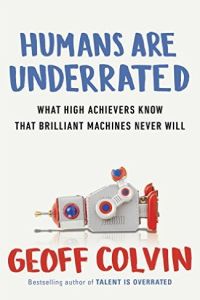Join getAbstract to access the summary!

Join getAbstract to access the summary!
Geoff Colvin
Humans Are Underrated
What High Achievers Know That Brilliant Machines Never Will
Portfolio, 2015
What's inside?
Tap into your human empathy to find your socioeconomic value in the digital age.
Recommendation
Will computers take your job? According to financial journalist Geoff Colvin, they’ll take the “cognitive” work but not the “interaction jobs.” He rejects the “nightmare future” scenario of jobless humans supplanted by brilliant, all-purpose machines. Instead, he reports on the emerging socioeconomic value of being human – and, because empathy is the new incalculable skill, the more human the better. Human beings naturally bond with each other and many jobs depend on that bonding. People must relearn how to connect in person. Colvin cites research and case studies showing the value of empathy in social life, work, sports and even in combat. He says “relationship work” is the new knowledge work. getAbstract recommends his fresh, far-reaching insights to CEOs, HR professionals, leaders who want to “humanize” their organizations and job hunters who similarly want to maximize their personal value in the digital age.
Summary
About the Author
Senior editor at large for Fortune magazine, Geoff Colvin also wrote Talent is Overrated: What Really Separates World-Class Performers from Everybody Else.




















Comment on this summary